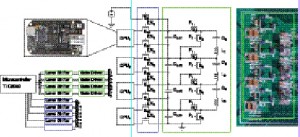Differential Power Processing for Series-Stacked Processors
MS student Andrew Stillwell with advisors P. Sauer and R. Pilawa-Podgurski
As the capabilities of the internet and cloud services grow, so grows the demand for data centers. Data centers are increasingly occupying a larger percentage of the U.S. energy capacity, leading to a need for efficient power delivery to servers. One trend in servers is the move to many, smaller, lower power processors in a compact form factor with the intent to lower power consumption and decrease footprint. Prior research has focused on servers electrically connected in series to increase data-center power efficiency by removing a power processing step and applying differential power processing to balance the servers. This research investigates the application of differential power processing to series-stacked processors for improving multi-processor server or system efficiency.
Differential power processing (DPP) allows for highly efficient power conversion by processing only the difference in load currents of series-connected loads. Since DPPs handle less power, they can be designed with lower power rated components, making them smaller and less expensive. To further reduce cost and size, DPPs could be implemented in a CMOS process. Switch-capacitor (SC) converters are switching power converters that utilize capacitors rather than inductors as their primary energy storage element. Their main benefits are lower device stresses and high-energy density, allowing them to be implemented in a CMOS process. A prototype SC converter to balance a stack of 4 ARM embedded computers was developed as shown in Figure 29. The converter reached a peak conversion efficiency of 94.1% and a peak power delivery efficiency of 99.8%. This research is funded by the University of Illinois at Urbana-Champaign College of Engineering, Strategic Research Initiative.
